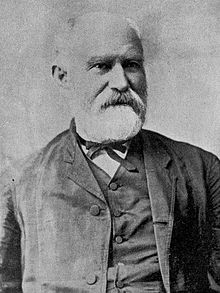Theodore Haultain
|
The Honourable Theodore Haultain |
|
|---|---|
 |
|
| 3rd Minister of Defence | |
|
In office 31 October 1865 – 28 June 1869 |
|
| Prime Minister | Edward Stafford |
| Preceded by | Harry Atkinson |
| Succeeded by | Donald McLean |
| Member of the New Zealand Parliament for Franklin |
|
|
In office 1864–1870 |
|
| Member of the New Zealand Parliament for Southern Division |
|
|
In office 1858–1860 |
|
| Personal details | |
| Born | 27 May 1817 |
| Died | 18 October 1902 (aged 85) |
| Spouse(s) | Jane Alison Bell |
| Relations | Charles Morison (son in law) |
| Children | four sons and five daughters |
Theodore Minet Haultain (27 May 1817 – 18 October 1902) was a 19th-century New Zealand politician and Minister of Colonial Defence (1865–69). He came to New Zealand as a soldier and farmed in south Auckland.
Theodore Minet Haultain was born according to family information on 27 May 1817 at Stony Stratford, Buckinghamshire, England, the son of Second Captain Francis Haultain, Royal Artillery, and his wife, Eliza Ann Dean. He went to Sandhurst from 1831 to 1834 and after being commissioned on 27 June spent 10 years with the 39th Regiment in India. He took part in the Gwalior campaign and saw action at the battle of Maharajpur on 29 December 1843. On 7 November 1844 Haultain married Jane Alison Bell, daughter of William Bell, at Agra, India. They had four sons and five daughters. His youngest daughter married the barrister Charles Morison. Haultain returned to England in June 1847 and was appointed staff officer of pensioners on 14 March 1849, and captain on 30 March.
On 18 September 1849, as a family man without notable career prospects, Haultain emigrated to Auckland, New Zealand, on the Oriental Queen, in charge of the 8th Detachment of the New Zealand Fencibles, military pensioners who were settled in villages to protect the southern approaches to Auckland. He commanded first at Onehunga, and then at Panmure.
Haultain took a number of public positions, becoming a member of Auckland's first borough council on 18 November 1851 and resident magistrate at Onehunga in 1855 and at Howick in 1856. He resigned from the army in March 1857 and devoted himself to farming at Mangere. He contested a by-election in the electorate of the Southern Division (of Auckland) on 8 May 1858 against David Graham and was elected by a majority of one vote. He represented the electorate until the end of the term in 1860, when he was defeated for the Raglan electorate.
Haultain's life had settled into the easy domesticity of the retired soldier but the outbreak of fighting in Taranaki in 1860 changed all that. The immediate effect on Auckland was to arouse fears for the town's safety. Haultain was asked by the Stafford government to help organise a defence force and he became on 26 April 1860 lieutenant colonel of the 1st Battalion, Auckland Militia.
In July 1863 Governor George Grey and the colonial government invaded Waikato. To hold the land seized from the 'rebellious' tribes, the New Zealand Settlements Act 1863, less euphemistically known as the Confiscation Act, provided extensive grants to military settlers. Four regiments of Waikato Militia were raised on this basis and Haultain recruited and took command of the 2nd Regiment.
...
Wikipedia
